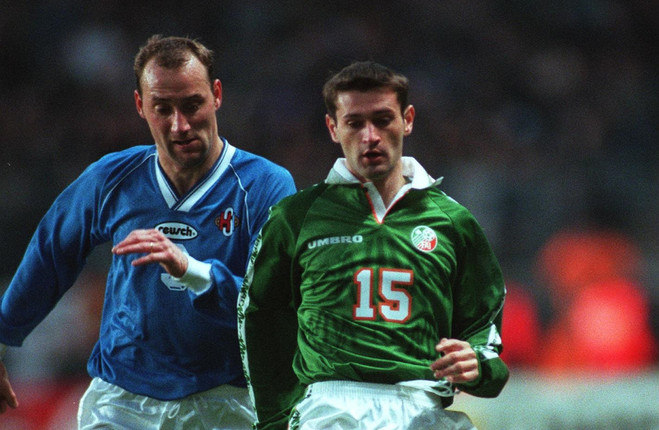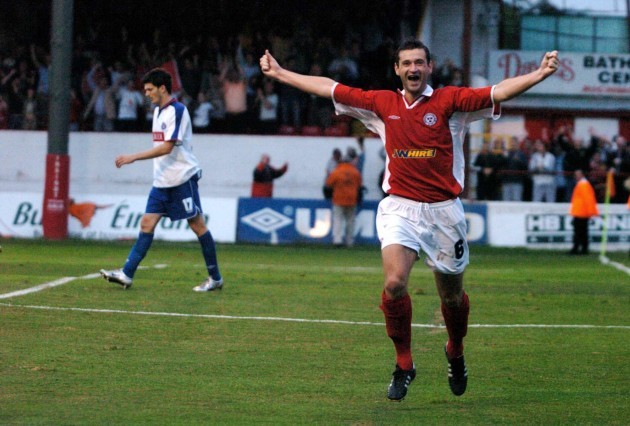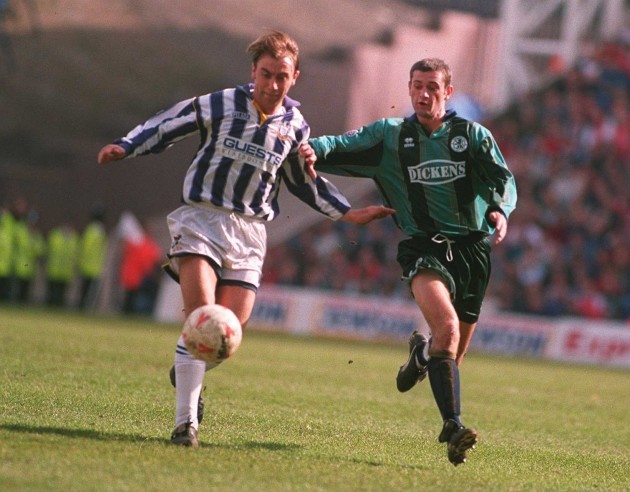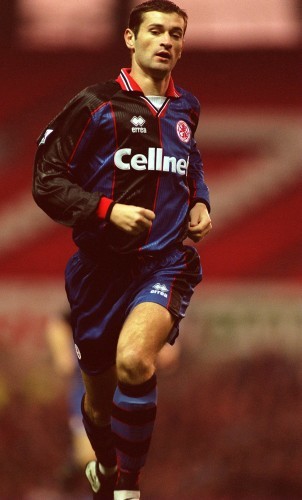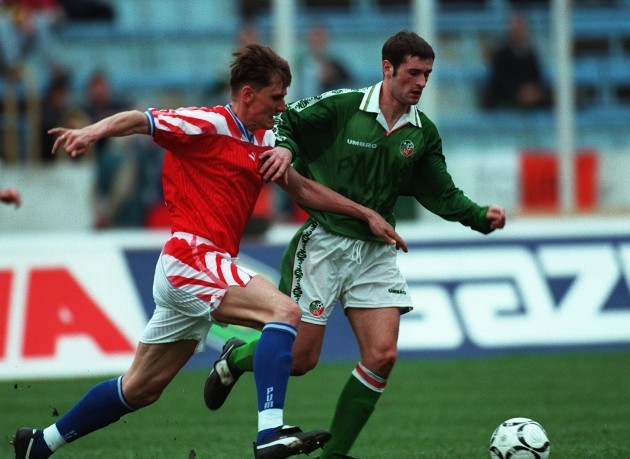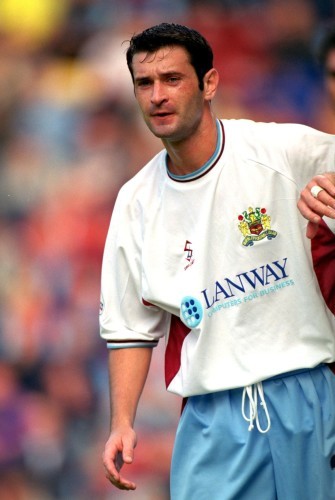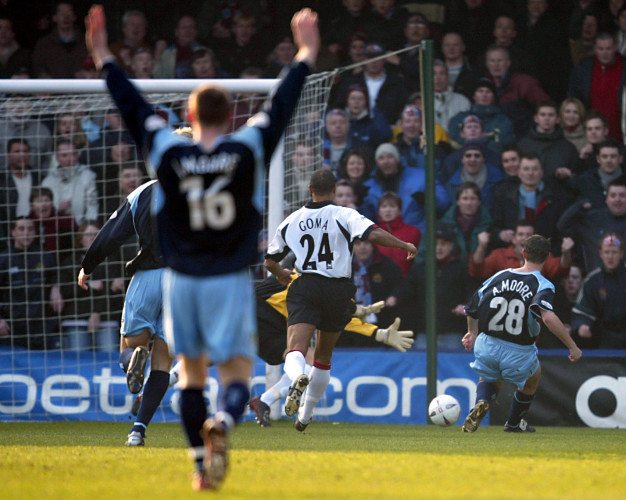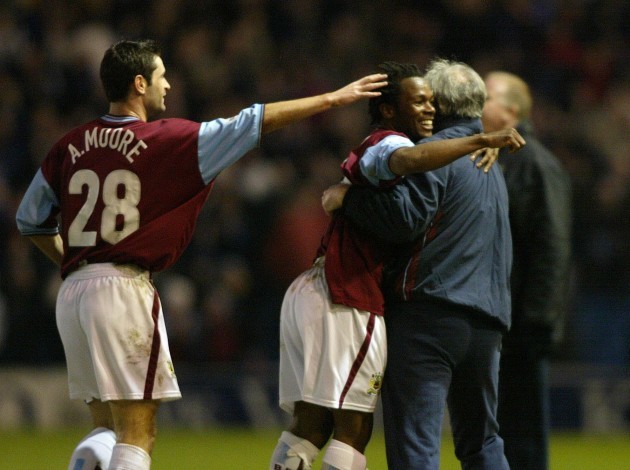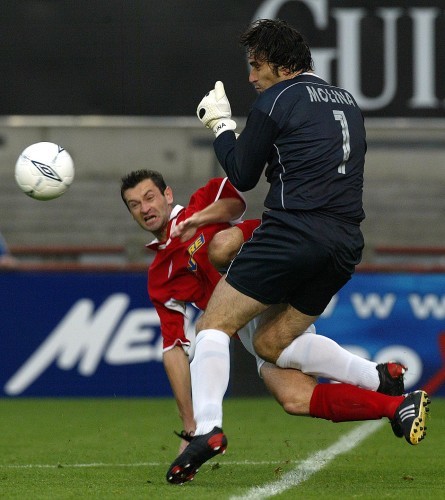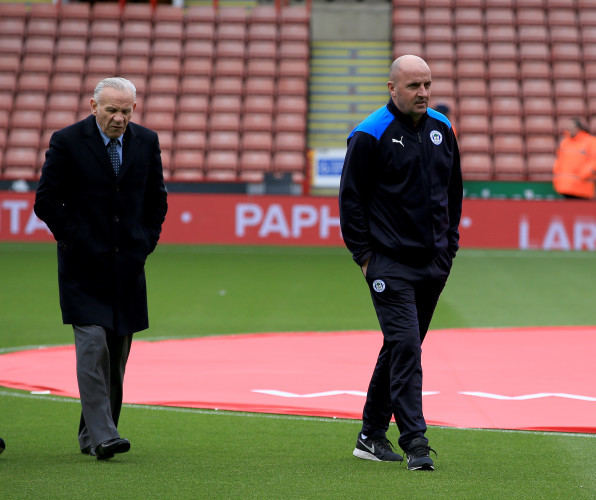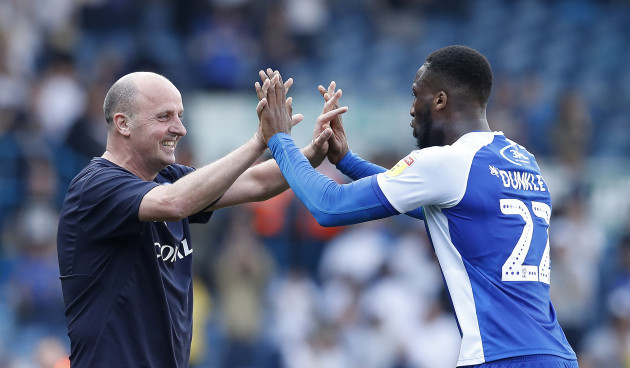ALAN MOORE USED to love writing stories in school.
For a little while they would be about horses and ponies and the trips he would take with his father and younger brother from their home in south Finglas to the tracks in Portmarnock or Coolock.
His father had horses in a stable by the airport, he would spend his early mornings taking care of them before going to work for Dublin Corporation. At weekends things would get really serious. “The American Harness Racing, with the chariots, that’s what they would race,” Moore recalls.
Slowly, his interest waned. “I had to get away from them. It wasn’t for me at all. I fell off, I was kicked, all sorts. Even now I don’t like horses. They’re just too powerful for me.”
Just one of the many vulnerabilities he is willing to reveal over the course of a weekend in which the 44-year-old reflects on his life to this point.
Moore was 11 when he left his father and brother to the horses. By that stage, Rivermount Boys Football Club was the centre of his universe. Based within the deep Tolka Valley, it is a place that looks as if it would close in and swallow you up with one bad touch.
For Alan Moore it opened his mind to the exciting possibilities of a different future.
It was the start of a dream.
The stories he wrote changed.
As he prepared for his Inter Cert (Junior Cert in old money), he continued to dream on the pages of his copybook at Patrician College – “the football school”– to the point a letter was sent to the family home urging him, well, to cop on and concentrate on getting a proper job.
“That was the school Ronnie Whelan went to. I knew it could be done. In my head I was looking at playing for Ireland in the 1994 World Cup. I worked it out that I would be old enough by then and it was achievable.”
Others knew it was, too.
“Alan was such a graceful player,” Joe Bennett, one of the founding members of Rivermount, beams. Joe is in his 70s now and only recently finished the latest bout of chemotherapy. Speaking about “young Alan” only brings joy. “He would be there one second and gone the next, gone by his man before he knew it. He was so shy compared to the others.”
“He always made things look so easy,” Pat Fenlon, another of the Rivermount graduates who later managed him at Shelbourne, recalls. “He was so smart, he had a football brain. He was quiet, determined, but did things on a pitch that would excite you.”
Alan Moore enjoyed and endured 10 years at Middlesbrough at a time when the club went on a feckless, cash-mad spree through the Premier League. He earned eight senior caps for Ireland – captaining all the underage sides along the way – and played for Barnsley, Burnley, Shelbourne, Sligo Rovers and Derry City, before calling it quits at the age of 33.
He scored one of the most important – almost forgotten – goals for a League of Ireland club in Europe, when he struck late away to Hajduk Split for Shels to nab the second away goal which proved crucial in helping to set up that famous Champions League clash with Deportivo La Coruna.
“It fucking annoys me that people don’t remember,” Stephen McGuinness, a childhood friend who is now general secretary of the PFA Ireland, says.
“It’s not like Skip (McGuinness) to get angry,” Moore chuckles.
There has been one divorce, followed by a second marriage to the wonderful, inspiring, caring Lucie that has given them three beautiful daughters – Sadie (15), Lexie (13) and Brontie (seven).
So, the day his career finished was not a sad day. He was ready for it, even if it was forced by another back injury.
This was the day he believed the pain would finally stop, that he wouldn’t have to take another pill and could actually dare to hold one of his daughters for longer than a few moments before the agony became too much.
“I wanted to have a normal life with Lucie and the kids, but it doesn’t actually fucking work out that way. It doesn’t work out that way. I still need pills.”
For the slipped disc and nerve damage that required back surgery.
For both his knees that were operated on.
For the calves with improper blood flow that meant he had to learn to walk again not long after celebrating his 21st birthday.
For the Achilles that he snapped.
The pain was only beginning.
His back got worse.
His knees got worse.
His legs got worse.
His Achilles got worse.
“My whole fucking body keeled in,” Moore sighs.
Rebound headaches started soon after he binned the tablets, painful migraines that continue to this day, engulfing his mind in a cloud because of his dependency on medication. He is back on painkillers, as proven by opening up the cubbyhole between the driver and passenger seat in his car.
“My little pharmacy,” he deadpans. “I can’t pass a supermarket without picking up paracetamol or ibuprofen because I can’t risk running out.”
There were countless epidurals to stave off back surgery, before it was a necessity. So many injections to get through games it would be impossible to count. Some of the medication he counts off hand to help relieve pain include Voltarol (causes havoc with the stomach) Brufen, Gabapentin (an anti-depressant prescribed after his back surgery) and Difene, the anti-inflammatory which only last year was linked to an increased risk of heart attack and stroke by the British Medical Journal.
The physical damage has been a blight since his early 20s. He is by no means immune but there is almost a numbness after what he has put his body through. There are times in conversation when you are met by a glaze and wonder if things are being taken in.
But they are.
“I’ve always been comfortable in my own skin,” he adds.
And yet, there was a time he wasn’t.
That physical anguish is easy to deal with compared to his mental health. Suicidal thoughts which first took hold during his teens manifested itself in the summer prior to his 40th birthday in November 2014.
He tried to take his own life.
Twice.
Two overdoses.
Both times Lucie was there to prevent the worst and now, five years on, he is no longer in complete darkness. But there are still questions.
“You want to know why you feel like this. You want to know, ‘why I am like this?’ You want to know what has changed and made you get into this fucking situation where you want to kill yourself.”
Those questions have not yet been answered.
But the one for this story is this: has it all been worth it?
***
The 2pm train from Leeds to Skipton arrives bang on 2.40pm and Moore is waiting outside. The sun is beaming, it’s still early and the weekend awaits enticingly. This will be a busy end to an already hectic week in what has been an arduous season.
The Dubliner now works as an opposition analyst for Wigan Athletic, where Paul Cook, his former Burnley teammate, and later Sligo manager, is in charge. It is Friday 12 April and the Latics are in a relegation dogfight in the Championship.
They are level on 41 points with Millwall and Reading – two points clear of Rotherham United in the drop zone. Ipswich Town and Bolton Wanderers are already down. The season is coming to a nail-biting conclusion and the first of five cup finals is on Sunday.
Wigan host leaders, the champions elect, Norwich City. Moore arrived back to Lancashire from Norfolk on Thursday after an eight-hour, 400-mile round trip to watch their 2-2 draw with Reading at Carrow Road on Wednesday night.
Tomorrow morning there will be one final, early-morning briefing at Wigan’s training ground before taking in the U18 academy game between Blackburn Rovers and Wolverhampton Wanderers 20 miles away at midday.
After that it will be across the Pennines to Elland Road for Leeds United’s Yorkshire derby with Sheffield Wednesday, the aim being to provide hope for Cook as he looks to outwit Marcelo Bielsa in Wigan’s bid for survival.
But before all that, we’re heading to the pub.
“Lucie and the girls have gone ice-skating,” Moore explains, as we set off on the 15-minute journey towards the small, picturesque village of Gisburn where they live. It is enveloped by hills and a sense of calm.
“A few pints then back to the house for dinner later on.”
This is certainly the day for it.
Moore speaks with a disarming softness, almost a groggy drawl. There is nothing bombastic or brash. He seems slightly on edge, though, perhaps because I am not the only visitor this weekend.
Sadie, his eldest, has her boyfriend Josh staying too. He plays in the same Middlesbrough youth side as Callum Kavanagh, son of former Boro and Ireland teammate Graham, who just happens to be one of his best friends.
Moore knows footballers inside out and sees only good in this one. “He has a kind soul, I think. He seems a nice kid and wants to do things the right way. And I told him I’d kneecap him if he messed her about.”
The tone never changes. You don’t know if he means it or not.
“Well, he doesn’t know if I do so that’s the main thing.”
He doesn’t mean it, but no harm keeping Josh on edge. Indeed, the two will go to the Wigan-Norwich game together on Sunday afternoon.
The Aspinall Arms in the heart of the Ribble Valley in nearby Clitheroe is our first port of call. Sitting in a conservatory looking out at the river flow by, this is the sort of English pub where it seems safe to order a pint of Guinness.
Moore has been kind enough to welcome me into his world, one he has always been happy to keep closed off from those he is unsure of. “That’s always been mistaken as arrogance but it’s just me. We are all different. I was a footballer and people expect something different of you. I never sought fame or money or anything else. I just loved playing football and was happy to be away in the countryside as soon as the match was over.”
This place is heaven. And so is the Guinness. Moore, after dallying over his order, is sticking with Peroni. “I don’t know what I want anymore.”
He’s talking about his drink, although you can never be too sure.
We sit and chat and start at the beginning. The horses and ponies never stood a chance once football came on the scene. He had a paper round earning £2.50 a week, all of which went towards a £40 pair of Puma Kings.
He was in love, but Finglas in the 1980s was not the sort of place where that was enough.
“There was great hardship for my parents. I was going on all these trials over to England and I knew they had to put their hands in their pocket for me. The money wasn’t always there. We had to fight for everything. Everything. They never came to see me play so there was never any pressure on me, I had no one shouting and screaming on the line so that helped and they let me choose whichever club I wanted to.”
He was 12 when Jack Charlton became manager of the Republic of Ireland and in his early teens when Ray Houghton put the ball in the English net. Moore learned to play on the street, the family Alsatian, Buster, helping sharpen his dribbling skills when weary friends had enough. “The dog would bite at my ankles. It taught me to move fast fucking quickly,” he laughs.
And he did, eventually signing for Middlesbrough at 16 when bigger clubs also chased his signature.
He didn’t like that Manchester United brought him over for several trials and placed him in the Salford University halls of residence with 30 other hopefuls. “I am shy, an introvert, imagine what that’s like when you’re a kid?” he reasons.
At Chelsea and Queens Park Rangers he could hardly hear himself think because of the busy Heathrow flight path above. Then it looked as if his story had the twist he craved. Liverpool, the club he supported, offered him a two-year scholarship.
Moore rejected it.
“In my own mind I knew my worth and what I wanted,” he says. “I knew I could hold out for a professional contract somewhere else.”
Evidence that shyness should not be mistaken for weakness.
Our pints are now foamy stains on the glass. It’s my shout. “Guinness and Peroni, please, mate,” my Dublin accent slowing to avoid having to repeat the order.
“How much for cash,” I joke. They are only going to get worse as the day goes on.
Moore is gone when I return. As the minutes go by and his absence lingers I begin to wonder… this wouldn’t be such a bad place to be left stranded. The flow of the river outside is mesmeric. The Guinness even more so.
Moore returns, explaining a friend was around the corner, and we continue, his answers delivered in that disarming Dublin drawl that is somewhat diminished, but not completely, after almost 30 years away.
“There are no football pictures in the house, I have my Ireland caps in a box somewhere, my Ma has some things framed in the house but they’re not on the walls or on display,’ he admits.
His girls may not have their father’s previous life rubbed in their faces but they have the football bug. “If they need help of course I’ll help. Maybe I could get them an Alsatian like I had. I’ll get out the back with cones and do what any father would do, spend time with their kids doing what they enjoy. Any child would love that, getting attention from their father and it’s not just football, the girls have tried netball too.”
The conversation then unexpectedly ricochets to Jill Neville – mother of Gary, Phil and Tracey, who is coach of the England netball team – whom he remembers fondly from his time in charge of the youth set-up at Bury.
“She was brilliant. She doesn’t have to work there, but she would be there in the ticket office on match day, dealing with everyone, dealing with the shit she shouldn’t have to, but she loves it. And the amount of people who hate her! She can be rude and moody but if she likes you, she’s brilliant.
“Jill liked me because she knew how to take me and I knew how to take her. You take people as you see them, don’t let other people tell you what’s what…
“But if I had three sons instead of girls, I would tell them not to go anywhere near football. It can be a ruthless, horrible business. You’re treated like a piece of meat.”
A series of injuries decimated a career which seemed destined for the greatest heights, having played an integral role in Middlesbrough’s promotion to the Premier League as First Division champions in 1995.
There is no anger or bitterness, but the hurt is palpable.
“You realise later on they (clubs) don’t give a fuck. It’s a mentality, you’re in a team game, it wasn’t about individuals. Now it is. Lads won’t play unless they’re 100% fit. We had a smaller group, you wanted to be part of it and help. But that began to change when I was playing too.”
***
We quickly move on, in the direction of home, but the destination is the impressive Holmes Mill beer hall, where the 5pm crowd is drawing ever closer and a wedding party are in great spirits in the function room to the left of the imposing 105ft bar which splits the room.
“I enjoyed making people happy and entertaining them because that’s what football is about,” Moore begins, as we take our seats away from the madness.
“I wanted to make Maradona runs as a kid and make a show of full backs but as you get older you realise you’ve got to be more productive and make the most of having the ball. But I always wanted to put a smile on peoples’ faces.”
His time at Middlesbrough straddled two different worlds: no money and new money.
From the historical Ayersome Park to the flash new Riverside Stadium, Moore was even used in the publicity shots to mark this brave new world as one of the academy graduates who was destined for stardom.
Lenny Lawrence, the man who gave him his debut, was replaced by the legendary figure of Bryan Robson. The money was rolling in and going out just as quick.
Neil Cox was signed for £1 million – a club record – and the spending continued, £50m in a period of four years.
Brazilian footballer of the year Juninho arrived for £4.75m in October 1995.
Nick Barmby cost more than that again when he joined for £5.25m soon after.
World Cup winner Branco came, so too Emerson, a third Brazilian, for £4m from Porto.
But the one that really put Boro on the map was the £7m capture of Italian superstar Fabrizio Ravanelli, who joined just a couple of months after he scored for Juventus in the 1996 European Cup final.
“It became like a runaway train,” Moore recalls. “I was lucky that I could step up the levels. I never felt intimidated by the likes of Ravanelli, I just wanted the ball and was like ‘yeah, I’m able for this’.”
Those arrivals caused a stir, more so in their own dressing room than anywhere else. With the average weekly wage previously in the region of between £4,000-6,000, Ravanelli was taking home £42,000 a week.
“A horrible man, a horrible man. He got away with it because he was allowed to. He came into the changing room and would sit with his four Italian agents, he wouldn’t speak a word of English to anyone else.
“For away games, he brought his own chef, we’d be in a five-star hotel by the way, but his own chef would cook his pasta because their pasta wasn’t good enough. When he got injured he was on the first flight back to Italy all the time. He didn’t try a leg away from home when it didn’t suit. The stuff he did and got away with was scandalous and that did bring friction, it did bring a divide. I have no problem with players earning big money, you get what you deserve, but Ravanelli was a mercenary.”
This is the first hint of bitterness, of a release that has been building up. It’s taken him more than 20 years. For Neil Cox the point of no return came much sooner – on the morning of the 1997 FA Cup final with Chelsea.
“He knocked him out,” Moore laughs. Ravanelli had damaged a hamstring a couple of weeks previously and disappeared to his home country for treatment, arriving back the day before the showpiece to declare himself fully fit.
Cox had already given an interview which then appeared on matchday saying Ravanelli shouldn’t play, and the pair came to blows. “It wasn’t mental or some sort of free-for-all, he was just knocked out because Neil had enough. Ravanelli was hated.
“This all hurt me because Middlesbrough is where I became a man, they stood by me with a four-year contract when I was out injured and I got to live out my dreams.”
Moore missed that FA Cup final after damaging his ankle in the semi-final replay, another source of great upset, and he was out for the entirety of the following season as his calf and knee problems wreaked havoc.
By the time he was fit again, Ravanelli, Juninho, Branco and Emerson were long gone. In their place came Paul Merson and Paul Gascoigne.
The madness continued.
A breathalyser was introduced at the training ground for Gazza, an examination he rarely passed, while Merson, signed from Arsenal and who would depart in acrimonious circumstances for Aston Villa after just one season, never seemed fully committed.
He was allowed live hundreds of miles away in the south and would commute on the train. Within the first week it became clear he was never going to make it in on time, so the fines’ committee – a trio of senior players – made it be known he would have to pay £50 for every minute he would be late.
Not a problem when you’re earning over £20,000 a week. “He came in the next day with cheque for 26 grand. He said he worked it out on the train home that for the days he’ll be coming in that would be the amount he would have to pay in fines for the season.”
Still, Moore can appreciate the ability. “An exceptional player. Miles better than Juninho for me. Not even close. He could do everything on one touch, and he could be good craic. He killed me in training one day.
‘What have you got?’
‘What do you mean?’
‘Well I’ve got the best outside right foot in the world, so what have you got?’
“That killed me. I’m not competing with that,” Moore laughs.
Boro still managed to make it to three domestic Cup finals – the FA Cup and two League Cups – in ’97 and ’98. However, they also suffered relegation after being docked points for postponing a fixture due to an outbreak of illness at the club.
“Things were already bleak. The fans loved Juninho and he did some great things but a lot of the problems those lads caused absolutely killed us,” Moore feels.
Gascoigne, unsurprisingly, almost did it for real when he commandeered the team bus before travelling to their first away game of the 1998/99 season with Villa. With an hour to kill in Darlington before departing, the bus was left unattended.
That was enough.
“Gazza set off in it, he flew over speed bumps, some of us were following in a car, he got to the very end of this road with two massive pillars and he has crumpled into it.”
But he’s not done…
“He tried to reverse out, he got to the other side of the road and there was this little old lady at a bus stop. He jumped out, threw the keys to the lady and said ‘there’s your bus’. He then had to ring the gaffer (Robson) to explain how there had been an accident. There were thousands worth of damage.”
Plenty would soon be inflicted on Moore, as the writing was on the wall for his career at the top level.
Before getting into that, another couple of pints in another pub. Darkness is still a bit off and his local, The White Bull, is just the place to stay to allow it fall before going home.
***
More Guinness and Peroni. More stories and memories.
He played four times for Middlesbrough between the start of the 97/98 season and when his contract ended in 2001. Five appearances on loan at Barnsley barely make a dent on the total.
“Those years dragged by, they take their toll,” he says.
When both of his calves would sporadically seize up and go solid due to a lack of blood flow, his feet would go numb. “I had dye injected into my veins to see if there was a blockage. They cut open behind both knees to relieve the build up, I needed 80 stitches in each leg and because the artery was wrapped around the muscle it meant I had to learn to walk again.
“But you can’t look back with regrets. Things happen for a reason, some were taken out of my hands but if you keep dwelling on that you will only feel anger, that’s not what I want.”
The issue with his calves led to far more problems. “I had my knee done. I had my Achilles done. The patella tendon in the knee too.”
This is where the advice and treatment he received can be described, at best, as questionable.
“There was bone digging into the patella tendon so they had to cut into that tendon to get through to the bone in the middle. I was told I would be back training in 10 days and playing in two weeks. I went for a 20-minute run with Gary Pallister and I was literally in tears, I said to him that I was sure the surgeon left the blade in there.
“I was given heat patches but was still in agony so went to see someone else about it. Because it was an operation on a tendon I was told it should have been a minimum of six-month recovery, but I was back running after 10 days, so by the time that was all sorted it was another season gone.”
They were quickly disappearing, as his Ireland dreams also disintegrated after making his debut under new boss Mick McCarthy away to the Czech Republic in April 1996. All eight of his international appearances came in the space of seven months that year, from the friendly in Prague, to the US Cup in the States to the three World Cup qualifiers he was involved in, the last of which was a 0-0 draw with Iceland in Dublin.
“Playing for Ireland was the pinnacle of everything I did. Playing at Lansdowne Road, it was unbelievable, it was different to every other football environment I played in because there were so many people there who knew you.
“Everyone was wishing you well and wanted you to do well. The faces you knew. There was no badness. It was a good place to be and it was surreal to play, it was something that I always dreamed of doing. I always felt full of life going home to play for Ireland. It was a distraction from everything else and always gave me such a lift, it was something I wish I didn’t want to let go.”
He had no choice. It was taken from him more than anything as his body failed him.
Dinner is ready and we are on the way. A busy home awaits.
***
Lucie Moore is born and bred in Burnley, but she is an Irish mammy at heart. When we arrive, the kitchen is warm and full of life.
There is Sadie, Lexie and Brontie, with next door neighbour Harriet adding an extra voice.
Gizmo is the shih tzu, the three cats are Tinkerbell, Buzz and Cinders.
Josh is the boyfriend. There is more meat on a butcher’s apron but Alan’s initial impression that he is a “kind soul” seems true as we watch him happily kick a ball around on the tiles with Brontie (or B as the family call her).
B then dribbles the ball up to her father, says hello and sticks it through his legs.
Emmerdale is finishing up and Coronation Street is about to begin in the kitchen. Leicester City v Newcastle is on in the living room, which is separated by a lovely dining room with an impressive brick-work fire-place.
We head in and B follows. Gizmo is never far behind.
“Daddy, what skill did you teach me?” B asks.
“A step over, B,” her dad replies. “Then the check back and run with the ball. That’s all I want you to do, run with the ball close to you.”
“Daddy, where were you born?” B continues.
“In a hospital,” Alan smiles.
“But where?”
“A hospital,” he repeats.
“Where were you born?” he asks.
“In Burnley!” B exclaims proudly.
“And what about Lexie?”
“Oh, oh.”
She’s temporarily stumped.
“Lexie was born in Ireland,” she declares.
“That’s right, but whereabouts in Ireland?”
“Oh… if I get it right will you throw the ball to me?”
“Of course”
“She was born in a hospital!”
Their laughs fill the room and B’s control isn’t too bad when the ball does come her way.
Lucie joins the fun with instructions disguised as questions.
“Will you have some lasagne, Dave?”
“Chips?”
“Garlic bread?”
“Another beer?”
B is still on a mission. “Mummy, where were Lexie and Sadie born?”
“Sadie was born in Chorley, Lexie was born in Drogheda and you were born in Burnley. Everyone was born in different places. Welcome to the world of your father’s job.”
The food is devoured. The beers – Corona and Budweiser – are cold and don’t last long either. The ice-skating trip earlier in the day is a topic of conversation when Lexie ventures from the kitchen.
“Mum told me you were horrendous,” Alan teases.
“Well I was better than Sadie. Sadie was absolutely useless and wouldn’t even go into the middle. How was work, Dad?”
“It was grand. Lexie, tell Dave who is likely to come into his bed later on.”
“A few people. No, not people. Animals! All the cats will come in at some stage throughout the night,” she warns.
Lucie returns.
“Any more food?
“Garlic bread?”
“Chips?”
“We have loads.”
A breather is needed, and as we sit and watch the rest of the football, followed by Gogglebox and one of those panel shows that acts as background noise, the girls (and Josh) make their way upstairs to watch a film.
“We are removing ourselves from the downstairs area,” Sadie announces for comedic effect. “Goodnight all.”
Alan and Lucie fell in love not long after he signed for Burnley in 2001. He was already married at the time but living a separate life. His first wife remained in Middlesbrough while he lived in a hotel for eight months.
“It was one of the toughest things I had to do, psychologically, the girl done nothing wrong. I just met Lucie and had a different connection, it was powerful. When someone says there is one person out there for everybody I know what they mean, that’s what we have.
“It’s why I gave her everything in the divorce. It came down to morals to do the right thing. It was lucky that we didn’t have kids.”
He started his family with Lucie. They spent the start of their lives together in Burnley before moving to Ireland and buying a house in Navan. Alan’s career took him to Shels, Sligo and Derry, and it looked like it would continue in coaching with Shamrock Rovers until Lucie’s father died suddenly of a brain haemorrhage.
“We had to move back home,” Moore explains. “It was just the right thing to do, the only thing. We wrote off a lot of money on the house but it had to be done.”
“I had to come home,” Lucie explains. “That was such a tough time, you never really recover fully, grief like that stays with you but it’s funny, I look at B and see a lot of my dad in her.”
Friday nights are much different for Lucie now. “When you were playing in Ireland I would have the split screen up watching Emmerdale and checking Teletext for the scores so I knew what to prepare for,” she says, sitting beside Alan on the couch.
“If they got beat or played shit, you weren’t having a conversation for three days. You didn’t go mad on the beer, you just sulked for days. You needed to have your space and I think part of the problem was you replayed everything in your head about everything that had gone wrong, not just your own game, you worried about the whole team.”
The conversation goes in all different tangents, there are more drinks, laughs and stories. Before we realise it’s almost 2am and we have to be up again in a few hours to make it in to Wigan’s training ground before eight.
After a brief standoff with Buzz on the bed, my head is finally able to touch the pillow. But not for long.
Morning soon arrives.
***
It’s just after 6.30am and I’m sticking my head out the window of my room – a view which sees the hills roll towards this lovely farmyard estate – to help sharpen the senses.
A shower helps – a choice of towels had been laid out by Lucie the previous night – and she is in the kitchen smiling before anyone else in the house has stirred.
“Al won’t be down until a minute before you have to leave, trust me,” she insists.
I do.
“So then. Coffee? Tea?”
“Coffee, please.”
The fog is beginning to evaporate with every sip – in my head and outside. “How has he been with you so far,” she asks.
“Has he spoken about depression? He will be open, he will talk,” she continues. “He’s got through it. We had three or four years where it was shit. It was really bad and he tried to take his own life. You could see a demise…
“Ah, he’s alive!” Lucie exclaims as Alan enters the kitchen.
We’re ready to head for the Wigan training ground around 40 minutes away and just as we are ready to set off Lucie comes out to the drive to point to the window.
B has come to wave her Daddy off.
We sit in silence for a few minutes before I bring up how he dealt with depression after finishing up.
“Stuff like that just creeps up on you. I’ve been for chats with the PFA and it seems, from what I can gather, that it’s something I’ve had from a young age and is in-built in me. From a young age I had a mindset, which probably sums up where I am with football, I never got too high but did get low.
“I never expected not a lot and if anything came above that it was a bonus. That’s the same with life, I never expected anything good in life.”
That seems at odds with the teenager who was prepared to turn down Liverpool’s scholarship offers and wait for a professional contract elsewhere.
“The glass was always half empty and anything above that was a bonus,” Moore continues. “Now I am living in constant pain, it wears you down. I used to enjoy golf. I have four sets of clubs in the garage but can’t use them. Eventually the pain you’re in, even getting up every day, little movements every day, it wears you down every little bit.
“From age of 20 it was just painkillers. To get out of bed in morning, my knee, my back, my Achilles; it was can of Red Bull and painkillers to get into work.
“The ops on both my legs, each leg op took between six and seven hours. To put that into context a heart bypass takes four and a half hours. So it’s a relief when you don’t have to play.”
He did his Uefa A coaching licence through the FAI and got a job running Bury’s youth set-up before doing the same at Carlisle United.
“I wanted to look after them as human beings as much as footballers. They are kids out of school, thrown into the big bad world, they’re now going to work every morning. You want to look after these people and make them good people. You want to give them the best experience you can for those years they’re with you, you want to make sure they are alright after football.”
We have only scratched the surface on this topic by the time we’ve pulled into Wigan’s training ground just before 8am. Manager Paul Cook arrives at the same time and it is his booming Scouse accent that is the dominant voice as he invites us into the office he shares with his staff to start the video analysis of how to set up at home to Norwich.
The plasma television screen is linked to a laptop which prepares different scenarios.
Darron Gibson is one of the first of the playing staff to arrive, dropping his head in the office to say good morning.
Goalkeeper coach Nicky Colgan, the former Ireland international, arrives soon after, midway through the presentation, and then, at 8.55am, there is knock on the back door.
“Reidy!” Cook and his assistant, Leam Richardson, say in unison.
“Always at this time, without fail,” first team coach Anthony Barry, another Scouser, adds.
True enough, Peter Reid, now 62 and on the staff in an advisory capacity, arrives in his full training kit. He pulls up a seat and leans back with his feet on the table beside the couch which myself, Moore and Richardson are squeezed onto.
“So, then, who have we got tomorrow,” Reid jokes.
Cook continues to dictate his plans to the video analyst operation the laptop beneath the massive screen.
They are also devising way of making the players believe they can get a result before the team meeting at 9am. That is when Moore and I head to the canteen for breakfast.
Salmon and scrambled eggs.
We find a quiet corner and continue the chat. The jokes and laughter which peppered the past hour soon dissipates as he explains what brought on the depression which eventually led to him trying to take his own life.
Taking Lucie’s advice, now was the time to get straight to the point.
What led to you trying to take your own life?
“It’s hard to put my finger on it. It just sort of creeped up. Lucie will probably say I had depression for fucking years but to get to that stage, it did sort of creep up. It came out of nowhere. There was no one trigger for it.
“Every day, they were the sort of recurring things that would come into my mind.”
That’s scary.
“I know. And there was no trigger for it. Whatever build up or what it was. I’d never miss a day’s work, but those thoughts would always be there with you. Nobody knows here. Nobody knows here.
Has that been a risk, to tell people?
“I felt that I got to a stage where I was getting over it when I was at Carlisle and was alright so went to the club to say ‘I just want to let you know, I’ve had a couple of incidents recently. I’ve tried to take my own life”. Their first thing they asked was whether it stress at work? I said “no, it’s nothing to do with that, I just said felt obliged to tell you and I’m ready to crack on with work’.”
What happened after you took them?
“Lucie came down stairs. She always got up early. I was on the floor in the lounge with tablets around me. She was upset, she was angry telling me what if the kids had come down and found me. But you’re not even thinking of them at that stage. I’ve been for counselling and all the rest of it. It’s a waste of fucking time [for me], they don’t give you answers. You go in there hoping for answers and they don’t give you answers. They just want to listen to you and don’t give you any help at all.”
What answers are you looking for?
“You go in and you want to know why you feel like this? You want to know why I am like this? You want to know what has changed and made you get into this fucking situation where you want to kill yourself. So, they go back over your old past and there are little things that crop up. I remember sitting in the Airport Hotel after playing for the Ireland 21s. My Ma was there and a couple of the lads having a few drinks and all the rest of it.
“I remember, I always had this thing in my head and I said it to them there, ‘I won’t live until I’m 23’. I always had this thing where I had a vision of myself driving my car straight into a wall. I was 18 or 19 at the time. I just had it that I won’t live past 23. So it’s obviously been in me for a long time.
“When I said that to her, she just said ‘don’t be silly, don’t be stupid’. Again, we’re talking 20 odd years ago when mental illness, nobody would have known anything about. Nobody would have cared. People just got on with stuff.
What made you do it in the end?
“I probably had a bit more, I remember having a drink so I was probably braver to get to the stage where you wanted to get to. You talk yourself out of it. It was always in there in my mind, creeping in there, and you’re just trying to fight it off.”
How are you still here?
“It got to the stage, I was at a bad stage, trying different medications, there were people from a crisis centre coming to house every day. Doctor and nurses came every day to check after the second time I done it. After that I felt low. I went to them and said: ‘I don’t feel good’.
“I went to the doctor with Lucie and I said: ‘I just want this pain in my head to go away, I need this feeling to go away, whatever it is inside my head please make it go away’. This was three or four years ago. Lucie was crying her eyes out. She had seen close up what I was going through every day.
“They put me on lots of different medication at the same time. I had blood tests done every week, I was on lithium too but that’s also for bulimia, which I didn’t realise at the time, so I started putting on weight and at the time I didn’t understand. I put on three stone in nine months which, again, doesn’t fucking help your moods. I was down to having one small meal a day. I was doing as much exercise as I could, everything I could to lose weight and then I stopped taking tablets last summer overnight when I got back from holiday.”
What happened when you did that?
“The doctor was not happy but I feel alright, I feel grand. I’ve got to the stage where I have a different outlook on life, on football and all the rest of it. I’m not going to kill myself for this job. I’ve done it with others. I’m not going to let a job have that impact on me anymore. There is more to life, I’ve got the girls, Lucie, my family.
“I generally feel in much better place and in a more relaxed mindset. Probably being quiet and overthinking everything doesn’t help. I always sort of go into a lot of detail in my mind of things and why things happen and why things don’t happen. I’ve always been like that. I feel like I carry a lot inside my mind and now I generally don’t really worry too much. There is more to fucking life than worrying about every little thing. It’s a mindset you’re in, you’ve been as well as you’re going to be so anything above that is going to be better isn’t it?”
Is your family the reason for that change?
“Lucie is made of strong stuff. Women are generally stronger than men, I think. Knowing that you have her behind you is always good, it makes life easier. Still, it’s not nice, it’s not fair for her to put her through it. She has been through a lot of shite.
“Other women might have walked away and said they had enough, they don’t need it. Some of the stuff I put her through, I wouldn’t have got out of bed for four or five days at a time. I wouldn’t have eaten, wouldn’t have drank. She got to a stage where she just asked: ‘what do you want me to do?’
“These moods would come and go and then be quite frequent. She would just ask, ‘what do you want me to do? Do you want me to talk to you? Want me to leave you alone?’ I didn’t know. When I’m in this place I don’t want to speak to anyone.
“The door would be closed, she had to get on with life outside that door with the kids. As easy as you go into it, you just as quickly can come out of it. I literally spent days upon days lying on bed doing nothing. That’s done now.
“To see B smiling, the little things that make her happy, that is what keeps you going. Seeing Sadie grow up and Lexie too. I just want to try give my kids the best upbringing possible. Lucie has had to do so much by herself. She really is an amazing woman.”
A few minutes later and the laughing and joking continues. This feels close to understanding how the depths of depression can co-exist side by side with vacuous smiles. Joe Royle, one of the Wigan directors who was appointed by the club’s new owners last year, is cracking jokes and telling stories about past glories with Everton.
There are memories of beating Manchester United in the 1995 FA Cup final.
There are stories about Duncan Ferguson.
There are more stories about Duncan Ferguson.
Moore smiles and gets involved in the craic. That’s how easy it is to bare your soul in depth and return to the shallow ease of nostalgia.
The road is calling once again.
Blackburn U18s versus Wolves U18s. It is a shorter drive, around 30 minutes, and most of the journey is carried out in silence. Rovers’ academy is a minute’s drive from the first-team’s training centre and is part of a complex that also includes a housing estate that perhaps only footballers could afford to live in.
We sign in for the U18 game and must wear badges citing said fixture. The U16s are playing on a pitch a few yards away but there is a steward ensuring people do not cross over. It is strict.
The game we are watching is also extremely poor. Blackburn take an early lead and the Wolves’ players’ heads drop. When a second goes in there is no reaction. These games do not illicit many memories for Moore, it is a totally different environment.
“I always come away thinking, ‘do any of these kids have the mindset to be the best player on the pitch?’ That was always what I wanted at that age, to be the best on the pitch. I get the feeling some now just want some nice bits for their video clips.
“There are not enough kids wanting to have an effect on games, they’re not taking games by the scruff of the neck here, so if they’re not going to be the best player here how can they expect to try and be the best in the reserves or get into the first team?
“The lads who do show it, and there are a few, they stand out a mile.”
No one is in this tame encounter, while there is all sort of excitement coming from the pitch behind us, where a diminutive two-footed midfielder is running the show for Wolves. “The difference is those lads there will have a nice contract already,” Moore says, pointing to the U18s’ pitch. “The kids over here are playing for one.”
At half-time, former Manchester United U18 manager Paul McGuinness, now the English FA’s National Coach Developer, makes a beeline for Moore. There are a raft of young coaches, ranging from Premier League champions Manchester City to League One Walsall, here to learn.
The two compare notes on what they have been watching. There isn’t much to excite. The small kid running the show for Wolves U16s is taken off at half-time. It later transpires he is from Australia and his family moved to Britain to help him follow his dream.
We leave soon into the second half to go for lunch, the wind is howling and we have a trip across the Pennies for Leeds-Sheffield Wednesday at Elland Road to contend with. For some of that hour and a quarter we listen to the Championship scores come in.
Millwall and Sheffield United is scoreless.
Rotherham are two nil down to Stoke.
So far so good for Wigan’s survival hopes.
I fall asleep, my head slowly dropping before giving in. Alan laughs when I wake up not far from Leeds.
“You snore worse than the dog.”
“So long as I wasn’t drooling like him.”
Elland Road is visible over the horizon on the drive towards the city from the motorway. We pay the £3 for parking and now it’s Alan’s turn to have a nap, grabbing 30 minutes to himself in the car while I soak up some of the atmosphere around the ground.
A double-decker bus brings scores of visiting supporters. They see me and flick the Vs, banging on the windows and gesturing that I’m a wanker. I’m not a Leeds fan but it seems only right to return the favour.
We collect our complimentary tickets and take our seats right by the away fans. I keep my hands to myself this time. Just prior to kick off, the stadium is given a huge boost by Millwall’s late equaliser against their promotion rivals Sheffield United.
That’s not good news for Wigan, though, and nor is the fact Rotherham have also levelled with two second-half strikes at Stoke.
Leeds look sluggish and after Keiren Westwood, the occasional Ireland international, makes a couple of impressive saves as nerves begin to grow. They are put to bed when they break the deadlock soon after the break.
Moore has been studying the patterns of play intently, scribbling notes into his small pocket-sized notepad.
He brings up West Brom’s Jay Rodriguez as the best player in the division. “The smartest by a distance, he has a first touch very few defenders can deal with.”
His personal memories of this famous old ground are mostly bad. “This is where we were relegated with Middlesbrough,” he recalls.
We leave with about 15 minutes to go to avoid getting stuck in traffic. There is one last stop to make before Moore can return home to Lucie and the girls to attend a neighbour’s daughter’s birthday party.
On the way to dropping me off at a hotel by Leeds Airport, he discusses some of the audio books that have kept him company over the course of this season.
The Subtle Art of Not Giving A Fuck and Chimp Paradox get special mention.
“I’m always curious, always reading why people would say certain things or act in a certain way. Someone like Bielsa, he is a perfectionist and when you’re a perfectionist you’re never going to get to the end of what you want to achieve.”
Now I’m worried we might not get to the hotel. The sat nav has taken us off the main roads and into a small housing estate. Eventually we come out the other end of a lane with the hotel in view.
The end of the weekend is here.
Alan helps me with my bags and thanks me for coming.
The next day, Wigan draw with Norwich and a few days later they beat Leeds at Elland Road to effectively confirm safety.
It’s the ending he wanted for the story of this season.
His own one continues. Thankfully.
If you need to talk, contact for free:
- Pieta House 1800 247247 or email mary@pieta.ie – (available 24/7)
- Samaritans 116 123 or email jo@samaritans.org (available 24/7)
- Aware 1800 804848 (depression, anxiety)
- Childline 1800 666666 (for under 18s, available 24/7)
Subscribe to our new podcast, The42 Rugby Weekly, here:
